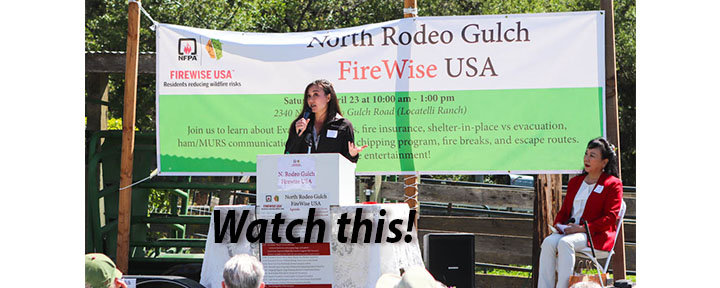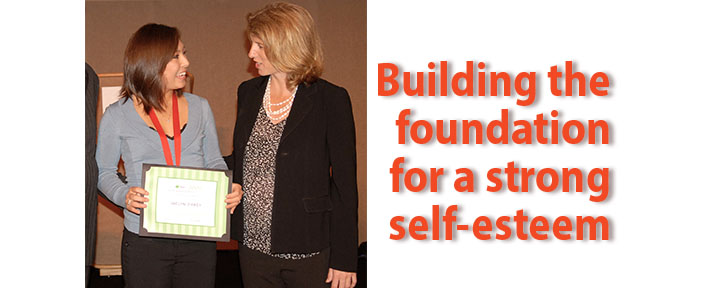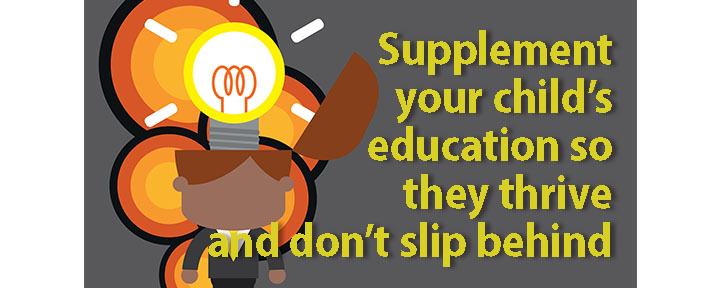
To all Firewise communities and all of those who live in wildland urban interface (WUI) areas, I’ve recorded our entire NRG Firewise Event presentations for you to share with your neighbors and communities. Our 2.5-presentation includes the experts to discuss 17 poignant topics to encourage residents to prepare for wildfires.
Hearing from Supervisor Manu Koenig, OR3, Central Fire, CalFire, Sheriff, ARES, CERT, ER doctor, MURS leaders, RCD, road associations, equine evacuation, Calif Fair Plan, and more, all in one place gives lots of information in an entertaining fashion. We even interviewed our vendors so our community could see innovative solutions offered in products and services.
Let’s reach out to our neighbors and communities to work together to mitigate wildfires from destroying our lives. We can do this!

To all Firewise communities and all of those who live in wildland urban interface (WUI) areas, I’ve recorded our entire NRG Firewise Event presentations for you to share with your neighbors and communities. Our 2.5-presentation includes the experts to discuss 17 poignant topics to encourage residents to prepare for wildfires.
Hearing from Supervisor Manu Koenig, OR3, Central Fire, CalFire, Sheriff, ARES, CERT, ER doctor, MURS leaders, RCD, road associations, equine evacuation, Calif Fair Plan, and more, all in one place gives lots of information in an entertaining fashion. We even interviewed our vendors so our community could see innovative solutions offered in products and services.
Let’s reach out to our neighbors and communities to work together to mitigate wildfires from destroying our lives. We can do this!

Being a teen today has many complexities that the rest of us old folks never had to maneuver. We didn’t have 18 months of social isolation where most of our interpersonal interactions were spent perusing social media posts. We didn’t have bullies who hid behind digital screens while they blasted hateful messages and photos to us for everyone to see. Most of the teens I work with today suffer from depression and devastating self-esteem issues.
Teens so desperately need to receive affirmations to feel that they’re normal. Whether it’s knowing that their favorite sweatshirt looks good on them or that they’re applying to the best colleges. I find it concerning when teens value their peers’ advice over their parents’ and even mine (I’m their college advisor!). One 16-year-old boy told me that it wasn’t until his peers gave him thumbs up, that he finally felt confident enough to share his idea publicly. While I know that teens trust their peers – especially the super popular and attractive teens, I worry that so much rides on what their peers (and others) think of them.
So how do we help our teens develop healthy perspectives and positive personal self-esteem? Projects! Brainstorming about an issue or problem, and then solving some portion of that problem by doing a project, helps teens find their voices and begin to establish who they are in this ever-changing world. The process of doing a project requires research, critical thinking, problem solving, and initiative. By delving into these 4 skills, these teens learn how to navigate real-world problems. They see how their personal impact positively affects others – and that’s REAL. It’s not a fickle peer’s comment or fleeting friendship; it’s knowing that they are doing something that needs to be done – and they’re doing it themselves.
I remember when Rory Kennedy (yes, that Kennedy) gave my youngest daughter Jaclyn an additional $10,000 scholarship (total $20,000) at the National Toyota Community Scholars event in Kentucky, Jaclyn told me that she was so proud to be recognized by such an esteemed group of judges. When I reminded her that I have been telling her how exceptional she was since she was 7 years old, she responded: “Yeah, but you’re my mom… Of course you’re going to say that!”.
I find that teens who do individual projects (not group projects and not things that are required by teachers or clubs) because they are interested in fixing these problems or exploring these areas, become confident, interesting, and happy young adults. They put their ideas and energy into developing projects that help society (or to become successful). You can’t take away self-esteem that is grounded in real work that they accomplish on their own.

Come hear our brilliant and innovative speakers share their ideas worth spreading at our COUNTDOWN hosted by TEDxMeritAcademy. This year we’re focusing on climate crisis and healthcare solutions.
Rio Theatre
Santa Cruz, CA
Sunday, Nov 7th
1:00-3:00 pm
Get your tickets at tedxmeritacademy.com/tickets

We’re heading into a dangerous fire season due to a dry winter and excessive heat. The fire department doesn’t have the manpower to save every home – especially in areas where homes are on several acres, like where I live – and inmate and volunteer crews are smaller due to COVID-shut downs last year. That’s why I’m excited to tell you about F.A.C.E. (Fire Activated Canister Extinguisher).
One of my students, Arul Mathur, designed and engineered this device to put out fires with water and fire retardant when activated by fire. So if a fire approaches your home, F.A.C.E. will douse it out, even when you’re not home. It’s ideal for people who have to evacuate. They can leave their homes knowing that the canister will spray a 10-15 foot area.
Check out his website.
He just launched a kickstarter campaign on July 1st, where you can order canisters at a discount and have them by September. He reached his kickstarter goal in just over 12 hours! He plans to use his profits to donate F.A.C.E. to create fire breaks throughout California. Proud of Arul.
I love it when kids solve problems we face. Arul lives up in the East Bay Area and almost lost his home during the Paradise fires. After surviving years of fire threats, he designed this device to protect his family and his home. Arul also gave a TEDx talk at TEDxMeritAcademy in 2019.

The College Board just announced that it will no longer offer the SAT II Subject tests or essay portions of the SAT. Even pre-COVID, the nation was already moving towards reducing testing requirements by making the SAT and the ACT test optional. So how do colleges determine which students are the best and most prepared to excel at their institutions?
As always, grades are the most important criteria that admissions officers consider when reviewing college applications. They look at what courses are offered, and which courses the student has taken. Selective colleges prefer to see students taking the most rigorous courses offered and acing them. Those who take AP, IB, or community college courses demonstrate that they can handle and excel at a higher level than those who take regular high school courses.
So now the pressure is on getting that coveted “5” on the AP exams and taking more AP courses. Instead of studying for the SAT Subject tests, students will study for the AP exams. Hmm, they’re both owned by the College Board. AP courses are supposed to be college-level classes taught in high school but most agree that they cover only about 30% of the concepts that are taught in introductory college courses.
Students who take AP courses spend the entire school year preparing for the AP exams in May. Their teachers present information, give study guides, and hammer facts that will be on the big exam. By preparing students to ace the AP test, they give dozens of practice tests and require vast memorization of concepts. This doesn’t allow these teachers to have Socratic seminars and discussions, or to assign research or projects to delve into these subject areas. Student learn to regurgitate information under pressure with loads of mind-numbing assignments – and then, they forget it all a month later.
About the SAT essay — I believe that this was actually the fairest way to determine if a student has the writing skills to be successful in college. By giving them 25 minutes to write a coherent essay, all students across the US had the same prompt and wrote their essays without any help. Critics of the SAT essay argue that there are other ways to determine how well a student writes – suggesting that their college application essays would do just that. Colleges aren’t naïve enough to think that students’ personal statements and short essays actually represent their real writing skills. Instructions on college applications even suggest that students have others proof read their essays before submitting them. Most students get more support than just proof reading…
Even though many colleges are going test optional in the future, the best students will continue to take the SAT or ACT to give themselves an edge in the college admissions process. Beyond the fuss over SAT subject tests and writing requirements, my recommendation is for students to do stellar independent projects throughout high school. This is the best way to stand out and get in.
 I remember worrying about the public and private schools in my neighborhood when I was pregnant with Nicole, my first child. I visited many classes to find the “perfect” school for her – and didn’t find one school that provided the academic rigor, depth in critical thinking and problem solving, the arts and theater, and the physical activities (dance, sports) that I was looking for. I didn’t bash schools for not offering what I wanted for my daughter; instead, I supplemented both of my daughters’ education so they would love to learn and get all of the important experiences to keep them engaged.
I remember worrying about the public and private schools in my neighborhood when I was pregnant with Nicole, my first child. I visited many classes to find the “perfect” school for her – and didn’t find one school that provided the academic rigor, depth in critical thinking and problem solving, the arts and theater, and the physical activities (dance, sports) that I was looking for. I didn’t bash schools for not offering what I wanted for my daughter; instead, I supplemented both of my daughters’ education so they would love to learn and get all of the important experiences to keep them engaged.
That’s exactly what parents will need to do during this pandemic, and most likely after this pandemic has passed. Yes, things are different now. Whether your school is 100% online, hybrid, or on campus, you can supplement your child’s education so they thrive. Use this time to experiment and try new approaches.
You can tell if your child is engaged in classes and work (asynchronous or synchronous). This is where you can fill the void by giving them interesting assignments or even inviting a mentor or teacher to work with them in virtual sessions. Here are some activities that I’ve set up for families during this pandemic:
1. Bamboo vs Oak Tree Experiment (to find faster, efficient ways to produce oxygen in the atmosphere)
2. Reading Challenge (to increase their reading fluency and comprehension)
3. Math Challenge (to build a solid math foundation so they’re prepared to move on to the next level)
4. Gardening Experiment (to determine which organic pesticides work best)
5. Research Writing (to teach them how to write a comprehensive research paper – something they probably will never learn in school)
6. Create a Podcast (to find their voices – and do research – and share their opinions)
7. Start a business (to learn about marketing, accounting, ecommerce)
If you find that your child is not thriving in whatever mode of learning they are engaged in, you can hire teachers to teach their classes one-on-one. Some states require that students be enrolled in a public or private school, so check with your state. It’s actually easier to open a private school for just your children (in most states) than to jump through hoops with homeschooling or independent studies programs.
You can also start a pandemic pod, see my blog: How to Form a Pandemic Pod for Free that can be free to the hosting family. In this setup, the hosting family hires the teacher, sets the curriculum and invites 2-3 other families to join. The other families’ tuition covers all costs so the pandemic pod is free to the hosting family. I’ve even written curriculum for preschool through high school.
While this is a stressful time as you make difficult decisions about whether to send your child back to school (if they’re opening) or worry that your child is slipping behind academically (for online classes), know that you have many options. Sometimes chaos gives us the unique opportunity to reinvent ourselves, and in the case of our children’s education, we can create something really stimulating and challenging for them. For me, I started Merit Academy with the projectMERIT theme. And yes, it was created when I realized that the existing academic options just weren’t good enough.

As we approach the start of the 2020-2021 school year, parents and students are worried and frustrated by the decisions their schools are making due to the coronavirus pandemic. Teachers and administrators are concerned about spreading the virus and how they can conduct classes keeping students 6 feet apart. Parents and students realize that their spring 2020 online classes did not offer the quality instruction and overall learning that they had hoped for. Another year of distance learning or hybrid programs will undeniably disrupt both the quality and depth of instruction and learning. So what are your alternative choices?
1. Individual Tutoring (Virtual)
While online or hybrid instruction offers safe learning environments, actual instruction time with real teachers and the depth of material covered during the semester is often truncated. Teachers may not cover all chapters in their textbooks and may require less assignments and exams. While this may seem trivial, students need to receive instruction for all concepts listed in the class curriculum in order for them to be successful in the following year’s courses. So even if the student gets an “A” in the class, they may not be prepared for the next class in the sequence.
Many students are working with tutors to take instruction to a deeper level. By having a tutor review and discuss concepts in depth, students can complete the course being better prepared and more confident. Tutors can fill the gaps when teachers simply don’t have the time or resources to support individual students online.
2. Small Homeschool with Real Teacher (Face-to-face)
Young students and students with learning differences can benefit from having classes at home with just a few students (2 or 3). Parents can select a teacher to teach these classes using curriculum and materials. All parties would be tested for the coronavirus and they would wear masks and maintain 6 feet distance. These classes offer more individualized instruction than online classes. Classes can take place in the home or outdoors. The hosting family can charge tuition for the classes to cover the cost of the teacher wages. I wrote this book to help set up these small homeschools.
3. One-on-One Classes with a Real Teacher (Virtual)
For high school students who want high-caliber individual instruction and grades to separate themselves from their peers (and competition for selective colleges), they can take accredited classes taught one-on-one with a real teacher. This ensures that the student develops skills and learns concepts at a deeper level. Classes are taught using Google Meet in a virtual setting. The teacher individualizes the instruction to best fit the student’s learning modes. Colleges accept these courses and appreciate that the student has taken extra measures to build their academic foundation so they can be successful when attending college. Check out Merit Academy’s one-on-one classes.
4. Do a project (Virtual)
While students are not taking classes on campus and participating in afterschool activities or extracurriculars, they may have more free time. Rather than playing videogames or binge-watching TV shows, students can do a project. Projects can range from writing a book, to developing an app, to creating a non-profit organization, to engineering a device. Some of my students are creating solutions to supply chain problems, while others are engineering fire prevention devices. One student is writing a book on teen angst with tips on how to avoid problems. These projects give students the opportunity to explore possible careers, and they all become more confident and interesting people when they complete these projects. Check out Beat the College Admissions Game with ProjectMerit.
If you don’t like your school options for 2020-2021, consider alternatives. You can make this unprecedented school dilemma a positive opportunity for your child to develop academic and professional skills so they can be more prepared to return to the classroom and position themselves to get into top colleges.

We are just beginning to see the impact of the coronavirus on our education system in the US. In California, we expect to lose about $1,400-$2,000 per student. That’s 15% reduction from the $13,000 per student the state now receives. This will likely translate to larger class sizes, layoffs and furloughs, and pay cuts when we resume classes. We’ll need much more than emergency funds and stimulus packages to save our schools, we’ll need the federal government to step in.
As a college advisor and director at Merit Educational Consultants, I’ve advised my students and their families to supplement their current education to ensure that they continue to learn and that they’ll be prepared for classes whenever they resume. I’ve taken a lot of heat for my stance because not all students can do this. Disadvantaged communities are always hit the hardest and my heart goes out to all of them. That said, here’s what I am recommending.
1. Reading:
This may be the only time when kids are bored of watching Netflix! Order books or ebooks and set up reading time each day. This will build reading fluency, vocabulary, and comprehension. Discuss the books with your children and watch movies based on the books. With at least 16 weeks before school starts up again, they can read dozens of books. Introduce classics to build the reading literacy.
2. Writing:
Writing critical analyses about the books they read will give them a huge advantage when they return to their classes. This requires them to think about the story lines and practice writing. Most classes aren’t requiring students to write essays at this time so having them write every day will improve their writing skills. They can also write letters to grandparents and family that they miss. Bringing back letter writing can be a good thing.
3. Math:
Continue to do math exercises in their textbooks or online programs. Math, like writing, requires practice and mileage. If they stop doing math, their brains will atrophy and they’ll fall behind when school starts up again. Give them math computer games that reinforce basic math skills. Move ahead in math textbooks and explore online programs like Khan Academy to get lessons and practice problems.
4. Science:
Review and cover concepts taught since the start of the school year. This will reinforce weak areas and introduce new lessons. Check online for labs and Youtube videos to enhance classes and to ensure that they are ready to move on to the next level in the fall.
5. Modern Languages:
Introduce radio, TV, and movies (with subtitles) in the modern language that your child is studying in school or any language of interest. This helps them stay tuned in with the language and it will build vocabulary and improve their accents. They can do online classes and play video games.
6. Projects:
Choose something that fascinates them and build a project around that. They can do something to help others during this pandemic. They can also write a book, start a club, create an app, design a gadget, build furniture, and do just about anything they’re interested in. Working with family and friends in Hangouts or Zoom, they can get guidance and support to keep them going. For project ideas, check out ProjectMerit.
Many classes will not complete all of the lessons listed on the syllabi, so block off time for your kids to do them on their own. Read those chapters or go online and get supplementary Youtube videos, Khan Academy lessons, or worksheets. By having a routine to do these supplementary activities, we may stave off stress and uncertainty. Kids love routines and they will be more prepared for school if they can spend a little time doing academics at home while sheltering in place.

I just harvested my first crop of shiitake mushrooms! Besides tasting delicious, mushrooms provide health benefits, and they can even devour plastic waste and possibly pests – I have a student doing a project on mushrooms as a pesticide. By growing your own mushrooms, you don’t have to worry about getting viruses from people touching them at the grocery store.
I used a kit from Far West Fungi to get started because it was so easy to do. They provide the substrate and the spores so all I had to do was open the bag, put in a few slits in the plastic bag, and watch them grow! This substrate will produce 4 batches of shiitake mushrooms over the next few months. I’m planning on growing mushrooms using spores put into tree branches next. Stay tuned for my next mushroom adventure!





With teachers scrambling to set up online classes; students doing minimal homework and not taking tests, finals, or standardized exams; and nobody leaving home for extracurricular activities, kids are getting bored. There’s only so many shows to watch, and even gamers are looking for a break.
When kids face uncertainty about their future and worry about their parents and grandparents getting COVID-19, our children are dealing with stress and anxiety. They can’t control their lives and there are no schedules: school, after-school activities, homework, test prep, chores, etc. Kids like routines and schedules – even though they used to complain about them – and they want to feel valued.
So let’s give our kids a purpose. Talk to them about the coronavirus and how it is affecting millions of people around the world. Compare trends in Asia and Europe to the United States. Read about what hundreds of humanitarians and volunteers to help those who are sick or homebound. Inspire your kids to do something to help others. This will make them feel important and appreciated.
With all the free time they now have, they can do things to help their local high-risk population, support healthcare professionals, or start a unique project. Kids can find creative ways to get food to seniors who are sheltering in place. They can sew masks for hospital staff. Kids can also start a project doing anything they care about.
All of these projects will give them valuable skills while boosting the way they feel about themselves. The best part — these projects will give them great talking points on their college application essays and interviews. By doing good things for others, they’ll boost their chances of getting into top colleges and winning scholarship dollars. Learn more about doing projects by reading my book: Beat the College Admissions Game by Doing a Project.
